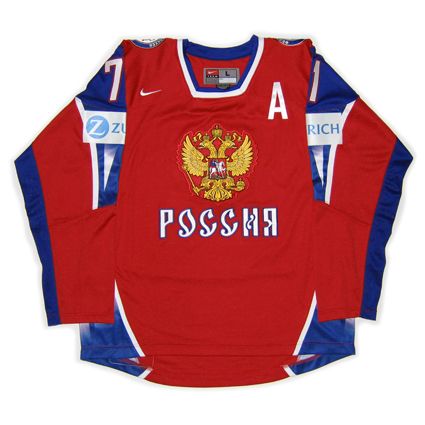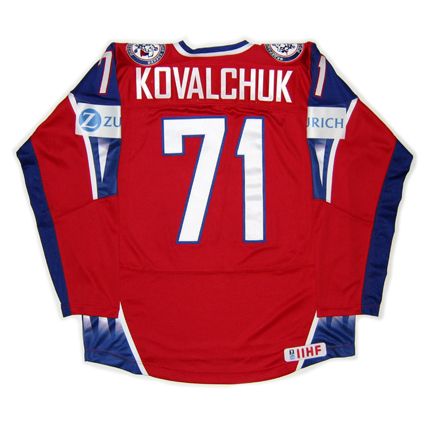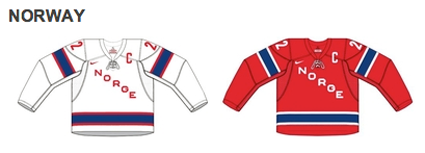
Saturday, February 13, 2010
1999 Norway National Team Per-Åge Skrøder Jersey
The fourth highest seeded team in Group A at the 2010 Vancouver Olympic Men's Ice Hockey Tournament is Norway.
The Norway National Ice Hockey Team is currently ranked 11th in the IIHF World Rankings. Based on their status outside the top nine ranked countries, Norway was obligated to participate in the Olympic Qualification process, a series of tournaments that date back to September of 2008. The host Norwegians were able to advance to the main tournament in Vancouver by defeating Denmark 5-3 in the deciding game of their group which also consisted of Kazakhstan and France.
The Norwegians have participated in the Olympics in ice hockey nine times since 1952, with their best result being an 8th place in 1972 and a 9th place in 1992. 2010 will be the first time Norway has qualified for the Olympic tournament since 1994.
Norway has participated in the World Championships dating as far back as 1937, with regular participation since 1958. Norway has never won a medal at the World Championships with their best finish being a fourth place back in 1951.
In recent times, they earned a promotion to the Top Division in 1989, were relegated in 1990, and played in the expanded Top Division from 1992 through 1997, when they were relegated once more. In 1999 they were back in the Top Division as hosts of the tournament and stayed there three years before once more dropping back down to Division 1. On their fourth try in 2005, they regained a spot in the Top Division, where they have successfully remained for the last four years, including a nice 8th place in 2008, which included taking Finland to overtime and beating Germany to avoid the relegation round. They then acquitted themselves well in a 2-1 loss to Canada in Halifax, Nova Scotia before bowing out of the tournament after reaching the quarterfinals.
Norway enters the 2010 Olympics with no NHLers on it's roster, as Ole-Kristian Tollefsen recently of Philadelphia was traded to Detroit which sent him down to Grand Rapids of the AHL. The remainder of the Norwegian roster comes from a number of leagues, including Patrick Thoresen, a former Flyer, currently an impressive 6th in scoring in the KHL, 11 players from Sweden's Elitserien, highlighted by the 2009 Elitserien's leading scorer Per-Åge Skrøder of Modo. Five players play in the GET-ligen at home in Norway, 6' 4" forward Tore Vikingstad leads the three player contingent from the German DEL and goaltender Andre Lysenstoen competes in the Finnish SM-liiga. 21 of the 23 players competed together at the 2009 World Championships, so they hope to bring some chemistry to the tournament that the elite countries may lack.
With the format for this year's Olympics calling for the top four teams after the Preliminary Round to receive byes into the quarterfinals, the key for Norway will be trying to keep their games as close as possible in the very difficult Group A, as the schedule makers have been very cruel to Norway, putting them up against hosts Canada on day one, followed by the United States two days later.
Unfortunately, the format of the tournament goes against the smaller countries like Norway, as the top teams will be looking to pour it on in the preliminary round since the short schedule puts a great emphasis on goal differential to determine who gets the coveted bye into the quarterfinals, or at least the most favorable matchup in the secondary round on February 23rd for a berth in the quarterfinals.
With the other qualifiers Latvia and Germany seemingly more suited to playing a shutdown, defensive style, better suited to keeping their games closer, the more offensively oriented Norwegians seem ill-suited to for the tournament, as they cannot be expected to keep pace in a wide open game against the likes of Canada, the US and Switzerland in Group A, all of whom are in the top 7 of the IIHF world rankings.
Expect Norway to give it their best shot, but tire as the tournament goes on and bow out in the secondary round as they draw an opponent such as Finland, the United States or the Czech Republic, if not worse, should any of the top three seeded teams suffer an upset in the preliminary round. Of all the teams in the tournament, Norway seems to be the one just making up the numbers, but that is more than can be said for Denmark, Kazahstan, Austria and Ukraine who all failed to qualify for Vancouver.
Sometimes just competing in the Olympic tournament is it's own reward, and Norway should take it all in and enjoy the atmosphere of being in the opening game against Canada in Vancouver and participating in the Olympics for the first time since 1994. Who knows? Belarus knocked Sweden out of the tournament in 2002 and every now and then, miracles can happen...
Today's featured jersey is a Nike 1999 Norway National Team Per-Åge Skrøder jersey as worn during the 1999 World Championships held in Norway. Skrøder scored four goals and had one assist for five points in six games, as the host Norwegians beat Italy to finish third in Group A and avoid the relegation round.
Skrøder started his career with four seasons in the Norwegian Eliteserien before moving to Sweden to play professionally since 1998, first with Frölunda, then Linköpings, followed by HV 71, where he won a championship in 2004, Södertälje and most recently Modo Hockey, where he won a championship in 2007 and was the Eliteserien's leading scorer in 2008-09 with 30 goals and 59 points in 55 games. He was also named Norway's Player of the Year in 2002.
This will be Skrøder's first Olympics in Vancouver after competing in the World Juniors and eight World Championships for Norway.
Here is a look at the jerseys that Norway will be wearing in the 2010 Olympics in Vancouver. These jerseys reprise the classic vintage jersey worn by Norway once in the 2008 World Championships as part of the IIHF Centennial Celebrations, which were based on the jerseys originally worn by Norway in the 1960's, with the addition of the even more striking red road version, one of our favorites in the whole tournament.

Today's video section starts off with highlights of Norway from the 2008 World Championship. Notice the white "Norge" 1960's vintage jeresys at the start of the video against Germany (wearing black). This would be the only time Norway would wear these attractive throwbacks.
Also take note of Norway scoring against Canada, proving they are capable of giving the Canadians a game to open the Olympic tournament, especially if Canada feels the pressure to perform at home with the entire nation watching.
No mention of Norwegian would be complete without the following video of the 1989 National Team singing "Heia Norge".
Dasherboard: While the Men's tournament does not begin until Tuesday the 16th, the women's portion of the Olympic hockey begins today. Their are eight countries fielding teams in the competition. Group A consists of Canada, Sweden, Switzerland and Slovakia, while Group B has the United States, Finland, Russia and China. After playing three games in the group stage, the top two teams from each group will advance to the medal round.
Look for the host Canadians to face off against the Americans for the gold medal, with Sweden having a shot, having knocked the American's out of the tournament in 2006 before losing to Canada in the gold medal game 4-1.
The Canadians won the majority of exhibition games leading up to the tournament (7-3) and seem to have the upper hand going in, which will only be aided by the support of their home fans. The United States, however, has won three of the last four World Championships and won't be intimidated by their recent record against Canada.
The Preliminary Round women's games will take place February 13-18, with the semi-finals on the 18th and the medal games on February 25th.
Labels:
2010 Olympics,
Norway
Friday, February 12, 2010
2009 Russia National Team Ilya Kovalchuk Jersey
The highest seeded team in Group B at the 2010 Vancouver Olympic Men's Ice Hockey Tournament is Russia.
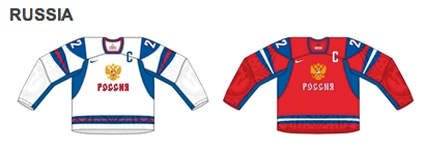
The Russia National Ice Hockey Team is currently ranked 1st in the IIHF World Rankings is one of the favorites to win a medal in Vancouver, having won the last two World Championships.
Based on their status as one of the top nine ranked countries, Russia was automatically entered in the 2010 Olympic tournament, allowing them avoid the qualification process for teams outside the top nine.
Russia has participated in the Olympics in ice hockey four times since 1994 after the breakup of the Soviet Union. In 1994 they finished in 4th place, followed by their best showing in 1998 with a silver medal in Nagano, Japan, the first Olympics with full professional participation. The followed that with a bronze in 2002 and another fourth the last time out in 2006.
Since 1992, Russia have been regular participants in the World Championships, with a number of medals to their credit. They first won a gold medal in 1993, still playing with the core of the last Soviet Union trained club. Following that success, the program fell into a down period when compared to the dominance of the Soviet Union. From 1994 through 2001, the Russians failed to win a medal of any kind, which included a dismal 11th place finish as hosts of the 2000 tournament. Russian fortunes too a turn for the better with a silver in 2002, bronze medals in 2005 and 2007 before regaining the gold in 2008 and backing that up with another gold in 2009.
The Russians have also participated in the World Cup of Hockey twice, reaching the semi-finals in 1996.
Russia enters the 2010 Olympics with 14 NHLers on it's roster, highlighted by Alexander Ovechkin of the Washington Capitals, currently the best player in the world. Other members of the incredibly potent Russian offense include Pavel Datsyuk, Evgeni Malkin, Ilya Kovalchuk and Aleksey Morozov, formerly of the Pittsburgh Penguins, currently playing in the KHL. Russia is so loaded up front that they neglected to name current KHL scoring leaders and former Olympians Maxim Shushinski and Alexei Yashin to their roster.
The Russian defense will be led by the offensively talented Andrei Markov and Sergei Gonchar, while the goal will be patrolled by Evgeni Nabokov, Ilya Bryzgalov and Semyon Varlamov, with Nabokov expected to play in the majority of the games and Bryzgalov a more than capable backup, having led the Russians to the 2009 World Championship.
This is a stellar lineup that sports, in addition to the 14 NHLers, nine players from the Russian KHL, including the familiar names of Sergei Fedorov and Viktor Kozlov.
With the format for this year's Olympics calling for the top four teams after the Preliminary Round to receive byes into the quarterfinals, the key for Russia will be defeating rivals the Czech Republic in the Preliminary Round on February 21 to go undefeated to ensure themselves one of the byes. This could be a tough task in the most difficult of the three groups. From then on, it's a single elimination tournament, with just two wins required to make the finals, and most experts are calling for Russia to be playing for gold on February 28th.
Today's featured jersey is a Nike 2009 Russia National Team Ilya Kovalchuk jersey as worn when Russia captured the gold medal at the 2009 World Championships as Kovalchuk was named the tournament's MVP after scoring 14 points in nine games.
Kovalchuk, who normally wears #17 in NHL competition in honor of former Soviet great Valeri Kharlamov, regularly wears #71 when playing for the National Team due to #17 being retired by the National Team in the late Kharlamov's honor.
A regular on the National Team, Kovalchuk, despite only being 26 years old, already has played in two World Junior U18 Championships, earning a silver and a gold, a World Junior u20 Championship, six World Championships, earning two bronze and two gold, as well as two previous Olympics, with a bronze to his credit in 2002.
Here is a look at the jerseys that Russia will be wearing in the 2010 Olympics in Vancouver. A jersey with too much going on, it has blue underarm flashes, oddly narrow stripes on both the waist and arms, with the arms then coming to a point toward the inside of the sleeves for some reason. Add in the color blocks for the numbers on the shoulders leave this jersey looking like a patchwork quilt. If that weren't enough, they have also added the subtle printing on the lower arms of the eagle from the crest to give you even more to look at.

Here, Kovalchuk scores the winning goal in overtime of the 2008 World Championships, defeating the host Canadians.
Next up is a compilation of Kovalchuk highlights from both the 2009 and 2008 World Championships.
Here is some classic footage of the Soviet Union winning the 1965 World Championships over Czechoslovakia.
Labels:
2010 Olympics,
Kovalchuk Ilya,
Russia
Thursday, February 11, 2010
1998 Czech Republic National Team Dominik Hasek Jersey
The second highest seeded team in Group B at the 2010 Vancouver Olympic Men's Ice Hockey Tournament is the Czech Republic.
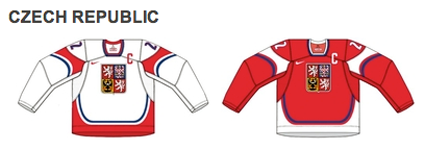
The Czech Republic National Ice Hockey Team is currently ranked 6th in the IIHF World Rankings and will be a medal contender in Vancouver, having won a bronze during the last Olympics in 2006.
Based on their status as one of the top nine ranked countries, the Czech Republic was automatically entered in the 2010 Olympic tournament, allowing them avoid the qualification process for teams outside the top nine.
The Czech Republic have participated in the Olympic ice hockey tournament four times since 1994 after the division of Czechoslovakia into Slovakia and the Czech Republic. Their best result was a gold medal in 1998 in Nagano, Japan thanks to the outstanding play of Dominik Hasek, the first Olympics with full NHL participation. In 2006, the Czechs won a bronze, their second Olympic medal since 1994.
Since becoming an independent nation, the Czech Republic have been regular participants in the World Championships, with a number of championship titles to their credit. Since 1993, the Czechs have won bronze three times, silver once and gold on five separate occasions, with the last being in 2005 when all the best players were available due to the NHL lockout. They are on a bit of a cold streak however, having gone without a medal for the last three years.
The Czechs have also participated in the World Cup of Hockey twice, reaching the semi-finals in 2004.
The Czech Republic enters the 2010 Olympics with 16 NHLers on it's roster, highlighted by Tomas Vokoun, currently playing outstanding in goal for the Florida Panthers. A strong defensive group should provide not only plenty of support for Vokoun, but generate some considerable offense from the back, with tons of experience and skill from the likes of Tomas Kaberle, Filip Kuba, Pavel Kubina and Marek Zidlicky.
The offense will be powered by Jaromir Jagr, currently playing with Avangard Omsk in the KHL, and the Czechs will need him to provide the offense, as only one of the Czech NHLers, Tomas Plekanec, is in the top 25 in league scoring and no one named to the roster even has 20 goals as of today. Others that the Czechs will rely on include David Krejci, Martin Havlat and Martin Erat. The Czechs also remain hopeful that team captain Patrik Elias will be back up to speed after returning from his recent concussion. Aside from the 16 NHL players, there are five from the KHL and two from the Czech Extraliga. Oddly, Vinny Prospal and Radim Vrbata, the #2 and #5 leading scoring Czechs in the NHL were left off the roster.
With the format for this year's Olympics calling for the top four teams after the Preliminary Round to receive byes into the quarterfinals, the key for the Czech Republic will be defeating rivals Slovakia in their opening matchup on February 17th. If the Czechs even tie that game, it will be a precious lost point that will likely cost them any chance of a bye into the quarterfinals, as one can expect at least one of the other two teams seeded second in their groups, the United States and Finland, to go 2-1 in the very brief preliminary round. If a win against Slovakia is achieved, they must take care of business against Latvia to set up a meaningful game against Russia on February 21 with the winner getting a direct route into the quarterfinals on February 24th and avoid having to play an additional game the day before.
Today's featured jersey is a Nike 1998 Czech Republic National Team Dominik Hasek jersey as worn when the Czech Republic captured the Olympic gold medal against Russia in Nagano, Japan.
The Olympics in 1998 were the first with the full participation of NHL players, as the league suspended it's regular season schedule for the occasion. Canada made several controversial decisions even before the tournament, as general manager Bobby Clarke chose Eric Lindros, who played for him in Philadelphia, as team captain over the likes of Wayne Gretzky, Steve Yzerman and Ray Bourque. In addition, Mark Messier and Scott Niedermayer were left off the team.
The United States, who had won the World Cup of Hockey just two years earlier were a huge disappointment, losing to Canada and Sweden in group play and getting eliminated by the Czechs in the first knockout round.
The Czechs, who had the fewest NHL players on it's roster among the top six nations with 11, got off to a good start by shutting out Finland 3-0 in their first game before demolishing Kazakhstan 8-2. The lost to Russia 2-1 in group play, but then bounced back with an easy 4-1 win to eliminate the Americans. The semi-finals saw them matched up against Canada, a close fought game that ended with a memorable shootout, as Hasek stonewalled all five Canadian shooters, relegating them to the bronze medal game after Canada once more surprised everyone by not having either Gretzky or Yzerman make attempts in the shootout, a decision by coach Marc Crawford that is still being talked about to this day.
The final game came down to a rematch between the Czech Republic and Russia, with defenseman Petr Svoboda scoring the only goal of the contest at 8:08 of the third period as Hasek shut out the Russians as he concluded the tournament with an amazing 6 goals allowed in 6 games against the top professionals from Finland, the United States, Canada and Russia - twice - to finish with a goals against average of 0.97.
After the medal ceremony, Hasek said, "When I saw the flag go up, I saw my whole career flash before my eyes from the first time my parents took me to a hockey game until now."
Here is a look at the jerseys that the Czech Republic will be wearing in the 2010 Olympics in Vancouver. Another typical modern jersey with gimmicky, curving stripes on both the arms and waist. It's crested with the traditional Czech Coat of Arms, but will become dated in short order as time passes.

First up in today's video section, the full shootout between the Czech Republic and Canada, where Hasek stopped all five Canadians as the pressure climbed with each round of shooters. Be advised that it's 11 minutes long and the shootout doesn't actually start until the 4:00 mark.
This next video tracks the Czechs throughout the tournament as they advance to reach the finals and then capture the gold medal, complete with deafening screams of Gooooooooooooooooooaaaal!
Last up today, a nice video we are really happy to share that complies the championships won by Czechoslovakia and the Czech Republic in the World Championships and Olympics, dating back to 1947 with some great rare footage and some classic old sweaters.
Dasherboard: Two links to direct you to today. First, there is an article on IIHF.com about the preparations of the jerseys that will be used for the Olympics that was an interesting read. The article is called The Joy of Jerseys, which sounds like a great name for this blog if we didn't already have one.
Speaking of the IIHF, the latest edition of their excellent newsletter IceTimes , which is naturally their Olympic preview issue, is now available online as a pdf file and is recommended reading.
Labels:
2010 Olympics,
Czech Republic
Wednesday, February 10, 2010
2004 Slovakia National Team Marian Gaborik Jersey
The third highest seeded team in Group B at the 2010 Vancouver Olympic Men's Ice Hockey Tournament is Slovakia.
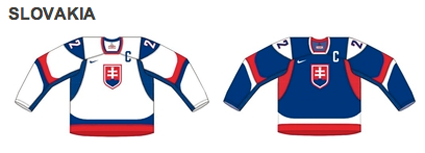
The Slovakia National Ice Hockey Team is currently ranked 9th in the IIHF World Rankings, a ranking that can be seen as deceptive given Slovakia's recent performances in the World Championships. Slovakia has placed a lowly 13th in 2008 and 10th in 2009, but with rosters devoid of many NHL stars who were otherwise occupied by participating in the NHL playoffs or passed on participating in the World Championships to heal nagging injuries from the long, just concluded NHL season. Once stocked with the best Slovakia has to offer, look for a much stronger team than one rated 9th behind Belarus and Swizerland.
Based on their status as one of the top nine ranked countries, Slovakia was automatically entered in the 2010 Olympic tournament, allowing them avoid the qualification process for teams outside the top nine.
The Slovaks have participated in the Olympics in ice hockey four times since 1994 after the division of Czechoslovakia into Slovakia and the Czech Republic, with finishes of 6th in 1994 and 5th the last time out in Torino, a result more in line with what is possible when fielding a roster without any restrictions, such as those faced in 2002 when the NHL did not break in time for Slovakia's best players to compete in the early Preliminary Round, costing them a chance to advance to the Final Round group stage when their star players, such as Peter Bondra, Josef Stumpel, Ziggy Palffy, Pavol Demitra, Marian Hossa, Miroslav Satan and Zedeno Chara, were either unavailable or limited to a game or two at best.
Slovakia proved the unfairness of this system by winning the World Championship just two months later when allowed to field a more complete roster, which resulted in the Olympic schedule being altered to match the NHL schedule break starting in 2006 to prevent such an occurrence from happening again.
In 2006, the Slovaks, now with a complete lineup of stars thanks to the format changes, ran through the preliminary round with a perfect 5-0 record which included wins over Russia, Sweden and the United States, only to be eliminated from the tournament in the first knockout games of the quarterfinals by their rivals the Czechs, who had only gone 2-3 in the preliminary round. It was a quick and disappointing end of the tournament for the Slovakians, and one they will be hoping to improve upon this time out.
Since gaining their independence, Slovakia have been regular participants in the World Championships, first being assigned to Pool C as a new country, the lowest rung of the ladder system, despite the Czechs remaining in the Top Divison. They proved their point by immediately winning Pool C in 1994 and followed that by winning Pool B the following year, completing a rise to the Top Division in the shortest time possible.
They slowly rose from a 10th place finish in 1996 to 9th and then a pair of 7ths before winning a silver medal in 2000. A drop back to 7th in 2001 was followed by the highlight of Slovakian hockey history, as they captured the World Championship in 2002.
Since that time however, the program has been in a steady, slow decline. They followed their championship with a respectable bronze medal in 2003 and then dropped to 4th, 5th and then 8th place. 2007 saw a rise to 6th, but then the dismal drop to the relegation round and a 13th place finish in 2008 and a 10th place in 2009, avoiding relegation thanks only to a narrow 4-3 win over Hungary.
Slovakia enters the 2010 Olympics with 13 NHLers on it's roster, highlighted by Chara of Boston, Marian Gaborik of the Rangers, Marian Hossa of Chicago and the surprise inclusion of 38-year-old veterans Palffy and Stumpel. Eight of the other Slovaks are currently playing in the Russian KHL, most of which have previous NHL experience like Branko Radivojevic, Marcel Hossa, Stumpel and Richard Zednik. Of the two remaining members of the roster, Palffy is playing in Slovakia and Lubos Bartecko is competing with SC Bern in Switzerland.
The key for Slovakia will be the play of their goaltenders, Jaroslav Halak and Peter Budaj, neither of which has established himself as a clear number one goaltender in the NHL this season, with Halak splitting time in Montreal and Budaj in a backup role with Colorado.
With the format for this year's Olympics calling for the top four teams after the Preliminary Round to receive byes into the quarterfinals, the key for Slovakia will be defeating Latvia by as many goals as possible on February 20th and coming away with at least a point against the Czech Republic in their opening matchup on February 17th to gain a favorable pairing in the Secondary Round knockout games on February 23rd.
Today's featured jersey is a Nike 2004 Slovakia National Team Marian Gaborik jersey as worn during the 2004 World Championships. Slovakia won Group B that year with wins over Ukraine and Finland, plus a tie with the United States. They proceeded to also win Group F in the next round by downing Russia and playing Sweden to a 0-0 draw.
They advanced with a 3-1 win over Switzerland before losing to Canada in the Semi-finals 2-1 and finished fourth after a 1-0 defeat in the bronze medal game in a rematch with the USA.
Gaborik has four goals and two assists for six points in nine games during the tournament.
He had previously played in the World Under-18 championships and the World Juniors (U20) twice each and then the World Championships in 2001.
He subsequently competed for Slovakia in the 2004 World Cup of Hockey and the World Championships in both 2005 and 2007 as well as making his Olympic debut in 2006. Despite some impressive personal performances (11 points in six games in 2007), he is still looking for his first medal at the senior level.
Here is a look at the jerseys that Slovakia will be wearing in the 2010 Olympics in Vancouver. It's a typical modern jersey with underarm flashes and gimmicky stripes that kick up on the ends on both the arms and waist. It's crested with the traditional Slovakia emblem, but will become dated in short order as time passes.

Our video selection today takes a look back at the excitement of Slovakia winning their first World Championship back in 2002.
Labels:
2010 Olympics,
Slovakia
Tuesday, February 9, 2010
2004 Latvia National Team Sergei Zholtok Jersey
The fourth seeded team in Group B at the 2010 Vancouver Olympic Men's Ice Hockey Tournament is Latvia.
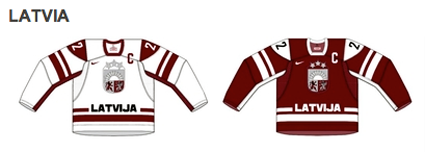
The Latvia National Ice Hockey Team is currently ranked 10th in the IIHF World Rankings and a team you take lightly at your own peril.
Based on their status outside the top nine ranked countries, Latvia was obligated to participate in the Olympic Qualification process, a series of tournaments that date back to September of 2008. The host Latvians were able to advance to the main tournament in Vancouver by going undefeated in their group thanks to a critical 4-2 over Ukraine in a group which also consisted of Italy and Hungary.
The Latvians have participated in Olympic ice hockey first in 1936 and then, after gaining their independence from the Soviet Union in 1991, again in 2002, with a best finish of 9th, and 2006. They also failed to qualify in 1994 and 1998.
Prior to 1940, Latvia competed in the World Championships in 1933, 1935, 1938 and 1939. Since regaining their independence, Latvia has been a regular participant in the World Championships, first being assigned to Pool C as a new country, the lowest rung of the ladder system. Right off the bat, the Lativans won Pool C, earning promotion to Pool B. Following a pair of second place finishes in 1994 and 1995, they won Pool B in 1996, earning promotion to the Top Division for 1997, where they have remained since, recording a best finish of 7th on three occasions and averaging a 10th place finish, generally avoiding the relegation round. When faced with competing in the relegation round, they have survived easily.
Perhaps the finest moment in Latvian hockey history came with the 3-2 defeat of the Russians at the 2000 World Championships held in Russia, which had great emotional significance for the Latvians given their past political history with Russia.
If that moment does not rank as the top moment, then the amazing comeback in the final game of Final Olympic Qualifying for the 2006 Olympics in Torino, Italy ranks surely must be. With both Latvia and Belarus off to 2-0 records, they were to meet in the final winner-take-all game of their group.
Another notable moment for Latvia was a 3-3 tie against the United States in the 2006 Olympics.
Belarus opened the scoring of the deciding game at 5:16 of the first and stretched their lead to two at 12:06 before Latvia answered at 18:33. The second period was played even, with each team scoring one with Belarus going back up by two at 1:49 before former Boston Bruin Grigori Panteleev scored 18 seconds later to return the margin to one in favor of Belarus.
Belarus put themselves in a good position with a goal at 9:11 of the third to make the score 4-2 for Belarus.
Now in desperation mode, Latvia pulled goalie Edgars Masalskis during a Latvian powerplay at the with just six minutes remaining in the game and down by two. The gamble paid off as Latvia scored at the 15:11 mark to reduce the margin again to one.
1:47 later the Latvians thrilled the home crowd by getting the equalizer at even strength, leaving just three minutes to decide who would claim the final remaining spot in the Olympics. Alexsandrs Semjonovs sent the home fans into rapture by finishing the comeback and punching Latvia's ticket to Italy just 33 seconds later to complete the three goal outburst in two minutes and twenty seconds in what would become known as "The Miracle in Riga".
Latvia enters the 2010 Olympics as a team in transition, with just two NHLers on it's roster, Karlis Skrastins of the Dallas Stars and Oskars Bartulis of the Philadelphia Flyers. A number of the previous generation of regulars on the Latvian National Team, such as Arturs Irbe, Sandis Ozolinsh, Grigori Panteleev and Aleksandrs Semjonovs, who were young enough to have been trained in the waning days of the Soviet hockey system, are no longer on the team and a number of their older players are clearly playing in their final Olympics. Still, 13 players return from the 2006 Olympic team this time out.
Outside the two NHLers, the remainder of the Latvian roster draws primarily from Dinamo Riga of the Kontinental Hockey Legaue (KHL), with 15 members of that club on the roster, which will hopefully give the Latvians a cohesiveness and familiarity with each other right from the start that most countries will be only hoping to find. Of the remaining six players, one comes from the IHL, two play in the German DEL and two others are with other clubs in the KHL. Also on the roster is the 40-year-old goaltender Sergei Naumovs, a veteran of a dozen World Championships.
With the format for this year's Olympics calling for the top four teams after the Preliminary Round to receive byes into the quarterfinals, the key for Latvia will be gaining as many points as possible against a tough group that contains Slovakia, the Czech Republic and Russia. The best case scenario for Latvia would include beating Slovakia, ranked only one place ahead of them in the IIHF World Rankings and hoping for a tie against the Czech Republic. Realistically however, Latvia will be trying to score as many goals as possible while playing a tight defense in order to give themselves the most favorable goal differential compared to the other lower ranked teams in order to gain the most favorable matchup on February 23rd in the Secondary Round to determine who will advance to the quarterfinals should they go winless in their group.
Today's featured jersey is a Nike 2004 Latvia National Team Sergei Zholtok jersey as worn during the 2004 World Championships. "Zholtok" is the North Americanized spelling of Sergei's last name, as found on his NHL jerseys, while it is spelled "ZOLTOKS" when he plays for his national team, with the "S" on the end indicating a masculine last name.
Zholtok was a regular member of the Lativa National Team whenever his NHL commitments would allow, and he competed in six World Championships prior to his premature death from a heart aliment while playing for HK Riga 2000 during the NHL lockout season.
Here is a look at the jerseys that Latvia will be wearing in the 2010 Olympics in Vancouver. The Latvians will be decked out in some of the nicest jerseys in the tournament. The timeless look of the two color jersey and the small version of the Latvian Coat of Arms creates a striking jersey made unique with Lativa's maroon coloring.

Today's video highlights begin with the stunning comeback by Latvia in the last four minutes of the deciding game of the Final Olympic Qualifying for the 2006 Olympics that would become known as "The Miracle in Riga".
While Latvia certainly faces and uphill task in Vancouver, no one, and we mean no one, has a better time at the games than the fans from Latvia, often drowning out crowds that number thousands more than them while playing on the road. If you are looking for an underdog to support in the upcoming Olympics, get on the Latvian bandwagon. Win or lose, it's always a fun ride.
Labels:
2010 Olympics,
Latvia
Monday, February 8, 2010
1989 Sweden National Team Thomas Rundqvist Jersey
The highest seeded team in Group C at the 2010 Vancouver Olympic Men's Ice Hockey Tournament is Sweden.
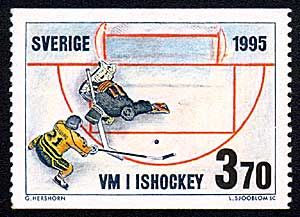
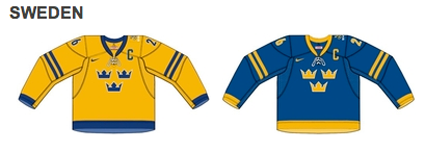
The Sweden National Ice Hockey Team is currently ranked 3rd in the IIHF World Rankings and will be looking to defend their gold medal won in the last Olympics in Torino, Italy in 2006. Based on their status as one of the top nine ranked countries, Sweden was automatically entered in the 2010 Olympic tournament, allowing them avoid the qualification process for teams outside the top nine.
The Swedes have participated in hockey at the Olympics 19 of a possible 21 times since hockey first became an Olympic sport in 1920, with finishes in the medals coming in just under half of their appearances. Their best results have been gold medals in 1994, following Peter Forsberg's famous goal in the shootout of the championship game, and again in 2006 in Torino, Italy against rivals Finland. Additionally, Sweden has also captured silver medals in 1928 and 1964, with bronze medals coming in 1952, 1980, 1984 and 1988.

The postage stamp commemorating Forsberg's
1994 shootout goal against Canada
Sweden are regular participants in the World Championships, with their first appearance coming in 1931. Considered one of the World's elite hockey nations, Sweden has never been outside of the Top Division of the World Championships in their history, with medal winning finishes coming more often than not.
The Swedes have captured the World Championship eight times, the most recent being in 2006 in Latvia. They have also won silver 16 times and bronze an additional 14 times, including the most recent tournament in 2009.
Considered one of the World's elite teams, they have also participated in the six team Canada Cup tournaments all five times it was held, with a best finish of second in 1984, and the eight team World Cup of Hockey twice, reaching the semi-finals in 1996.
Sweden enters the 2010 Olympics with 13 returning players from the 2006 gold medal squad and 19 NHLers on it's roster out of 23 players. Of the four remaining players, three are playing in Sweden's Elitserien and one in the Russian KHL.
The Swedes look solid all around with the New York Rangers Henrik Lundqvist in goal, a veteran defensive group led by Nicklas Lidstrom of the Detroit Red Wings and forwards Daniel and Henrik Sedin, with Henrik currently leading the NHL in scoring. It remains to be seen how much Swedish legend Peter Forsberg will be able to contribute, but Daniel Alfredsson, Nicklas Backstrom and Henrik Zetterberg are more than capable of leading Sweden to the gold medal if Forsberg is not up to the task.
With the format for this year's Olympics calling for the top four teams after the Preliminary Round to receive byes into the quarterfinals, the key for Sweden will be defeating Finland in their game on February 21st, a rematch of the gold medal game from 2006, in order to win Group C and avoid playing an extra knockout game the day before the quarterfinals on the 24th.
Sweden must also avoid overlooking Belarus, who will be looking to repeat their upset performance over Sweden in 2002 in Salt Lake City, in their second game on February 19th.
Today's featured jersey is a Tackla 1989 Sweden National Team Thomas Rundqvist jersey as worn in the 1989 World Championships, where Sweden finished in fourth place. This style of Tackla jersey was also worn in the 1992 Olympics with the familiar Tackla diamond shapes on the shoulders.
Sweden's jerseys are the most traditional of all the national team jerseys, similar to the Montreal Canadiens in that they remain essentially unchanged with only minor tweaks throughout their history and are more resistant to manufacturer trends than other countries. Sweden, in fact, won the last Olympics in 2006 wearing regular style jerseys, while every other country, save Swizterland, was wearing the supposed performance enhancing Nike Swift jerseys for the first time.
Here is a look at the jerseys that Sweden will be wearing in the 2010 Olympics in Vancouver. The Swede's can always be counted on to bring their usual understated class to any tournament with their three crowns, or "Tre Kronor", and minimal striping, regardless of the design trends of the day. This year's jersey adds the vintage touch of the lace-up collar to to their unique and traditional yellow home jersey and blue roads.

Sweden has a long and illustrious history to draw on for today's video selections, and we begin with a look at several of the gold medals Sweden has won since 1987.
Here is the conclusion of the shootout in the gold medal game at the 1994 Olympics in Lillehammer, Norway, which included Forsberg's famous goal.
In 2006, Sweden became the first country to win both the Olympics and the World Championships in the same season.
Here are highlights of the Gold Medal game against rivals Finland.
And here they celebrate the historic double by winning the World Championships three months later.
Finally, Kent Nilsson scores for Sweden against John Vanbiesbrouck of the USA in the 1989 World Championships and is congratulated by Thomas Rundqvist, wearing today's featured jersey.
Labels:
2010 Olympics,
Sweden
Subscribe to:
Comments (Atom)



